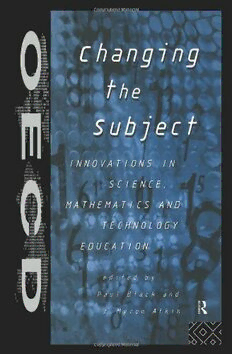
Changing the Subject: Innovations in Science, Mathematics and Technology Education PDF
222 Pages·1996·1.466 MB·English
Most books are stored in the elastic cloud where traffic is expensive. For this reason, we have a limit on daily download.
Preview Changing the Subject: Innovations in Science, Mathematics and Technology Education
Description:
Change in education is too often a process which enthusiasts, ranging from top policy makers to groups of teachers, plan and drive forward, but in which they all find unexpected pitfalls. Every innovation depends on the commitment of schools and teachers to make it work. But often that commitment is lacking, or is less than total, or it turns to fustration as events develop. This book is based on a set of stories from teachers and education professionals in thirteen OECD countries. Twenty-three case studies of educational innovation in science, mathematics and technology have involved school teachers, inspectors, academics (both subject specialists and educational researchers), policy makers and advisors. The case studies come from Australia, Canada, France, Germany, Ireland, Japan, the Netherlands, Norway, Scotland, Spain, Switzerland and the USA. Drawing on this rich variety of material the authors concentrate on the origins and purposes of innovation within and across the science, mathematics and technology curricula. They consider the conceptions of the three subjects, along with issues of teaching, learning and assessment, and explore the involvement of both teachers and students. They reflect on the various strategies adopted to cope with or bring about change, and offer valuable insights to advisors, developers, policy makers and practitioners, both in schools and outside. The writing team includes Paul Black, King's College London; Mike Atkin, Stanford University; Raymond Duval, University of Lille; Edwyn James, Consultant, OECD; John Olson, Queen's University of Kingston, Ontario; Dieter Pevsner, Consultant, London; Senta Raizen, National Centre for Improving Science Education, Washington; Maria Saez, University of Valladolid, Spain; and Helen Simons, Southampton University. Published in association with the OECD
See more
The list of books you might like
Most books are stored in the elastic cloud where traffic is expensive. For this reason, we have a limit on daily download.
